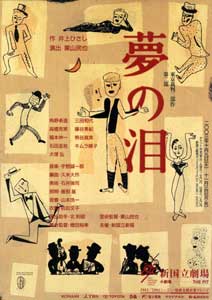 The
play Yume no Sakeme (A Crack in the Dream), performed at the NNTT in
May 2001, was created by starting with the concept of looking at the
Tokyo Trial from a picture-card showman’s viewpoint and turning
it into an epic play with music. In the series of performances of new
plays at the Pit in the 2000/2001 season whose theme was “The
Age and Memory,” the play was highly rated as a work that boldly
tackled a serious subject from the viewpoint of the masses and was supported
by many viewers. In particular, the rich musicality of the play, which
transcended the framework of musical drama, produced a potentially expandable
dramatic space by liberating the mind of characters in an elaborately
crafted drama and also by eliminating explanatory stage settings. The
play Yume no Sakeme (A Crack in the Dream), performed at the NNTT in
May 2001, was created by starting with the concept of looking at the
Tokyo Trial from a picture-card showman’s viewpoint and turning
it into an epic play with music. In the series of performances of new
plays at the Pit in the 2000/2001 season whose theme was “The
Age and Memory,” the play was highly rated as a work that boldly
tackled a serious subject from the viewpoint of the masses and was supported
by many viewers. In particular, the rich musicality of the play, which
transcended the framework of musical drama, produced a potentially expandable
dramatic space by liberating the mind of characters in an elaborately
crafted drama and also by eliminating explanatory stage settings.
Yume no Sakeme is the first in the trilogy that Inoue Hisashi has long
planned against the backdrop of the Tokyo Trial. The second play, Yume
no Namida (Tears of the Dream), which will be presented this time, portrays
Japanese people and society from Inoue’s unique viewpoint though
it has a different story setting and different characters. Yume no Namida
takes as its principle theme both the “crimes against humanity and
peace,” for which Japanese military leaders were tried during the
Tokyo Trial, and the Japanese people’s responsibility for the war,
while the interesting and profound world that is so characteristic of
Inoue unfolds. Crimes against humanity and peace are an issue that the
entire world has been faced with since it was drastically changed by the
September 11 terrorist attacks.
Pursuing the significance of the Tokyo Trial in contemporary history,
Yume no Namida is a serious yet comic play in the style of a musical drama
that vividly depicts the difficult post-war lives of people who were obliged
to be involved in the historical military tribunal. The forthcoming production
will bring together Director Kuriyama Tamiya and a highly experienced
production staff, as well as Kadono Takuzo, Mita Kazuyo and various other
actors and actresses who have an established reputation for their solid
acting. Audiences can look forward to this much publicized work, featuring
live music, which is bound to fascinate and entertain without being too
heavy.
<Tokyo Trial>
Officially known as the International Military Tribunal for the Far
East, it convened in May 1946 with 11 justices representing the Allied
Powers on the bench. The tribunal brought charges against political and
military leaders of the Japanese government during the Pacific War, known
as the so-called Class-A war criminals. In November 1948, verdicts were
handed down upon the 25 defendants, including Tojo Hideki, the prime minister
when the war was declared, and six other leaders who were sentenced to
death by hanging.
|
 The
play Yume no Sakeme (A Crack in the Dream), performed at the NNTT in
May 2001, was created by starting with the concept of looking at the
Tokyo Trial from a picture-card showman’s viewpoint and turning
it into an epic play with music. In the series of performances of new
plays at the Pit in the 2000/2001 season whose theme was “The
Age and Memory,” the play was highly rated as a work that boldly
tackled a serious subject from the viewpoint of the masses and was supported
by many viewers. In particular, the rich musicality of the play, which
transcended the framework of musical drama, produced a potentially expandable
dramatic space by liberating the mind of characters in an elaborately
crafted drama and also by eliminating explanatory stage settings.
The
play Yume no Sakeme (A Crack in the Dream), performed at the NNTT in
May 2001, was created by starting with the concept of looking at the
Tokyo Trial from a picture-card showman’s viewpoint and turning
it into an epic play with music. In the series of performances of new
plays at the Pit in the 2000/2001 season whose theme was “The
Age and Memory,” the play was highly rated as a work that boldly
tackled a serious subject from the viewpoint of the masses and was supported
by many viewers. In particular, the rich musicality of the play, which
transcended the framework of musical drama, produced a potentially expandable
dramatic space by liberating the mind of characters in an elaborately
crafted drama and also by eliminating explanatory stage settings.